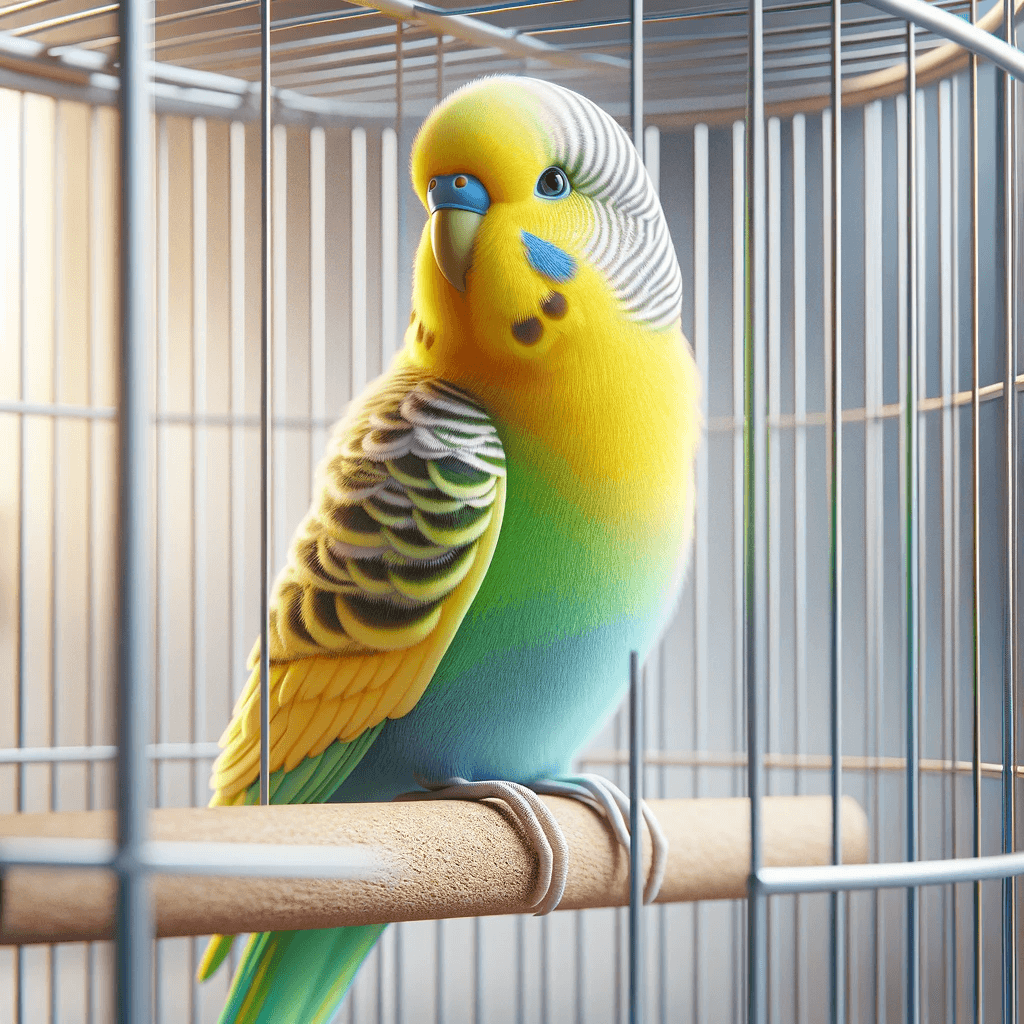Parakeets, known for their vibrant feathers and chirpy songs, aren’t immune to the grip of modern issues. Imagine your feathered friend suddenly swapping its cheerful tunes for moody silence. It might sound absurd, but even these little birds can fall prey to the clutches of fentanyl addiction.
Physical Dependence
Gone are the days when your parakeet would get excited over a mirror or a little bell. Now, it’s more interested in your medicine cabinet than its own cage. That’s a sign of physical dependence.
Seeing your bird snooze more often than not? It might not just be catching up on beauty sleep. Overuse of substances like fentanyl can lead to increased drowsiness in birds, a sign they’re becoming physically dependent.
And remember how it used to sing every morning? If those melodious tunes have turned into barely-there chirps, it’s not just being shy. Changes in vocalization can be a subtle hint of your parakeet’s struggles with substance dependence.
Withdrawal Symptoms
Your parakeet used to be the life of the party; now it’s more like the grumpy neighbor. If it’s getting irritable when it can’t nibble on your fentanyl patches, that’s a classic withdrawal symptom.
Ever seen a parakeet refuse its favorite treat for a pill bottle? That’s not a new diet trend; it’s a sign of withdrawal. When they choose meds over millet, it’s time to worry.
And those morning serenades you loved so much? If they’ve turned into squawks and screeches, your bird isn’t trying out for a punk rock band. It’s going through withdrawal, and it’s not pretty.
Increased Tolerance
Your parakeet, once thrilled by a few seeds, now seems unfazed unless it gets its beak on something stronger. That’s not evolving taste buds; it’s a red flag for increased tolerance.
When your feathery pal starts needing more and more just to chirp happily, it’s not about upping its game. It’s a serious sign that tolerance levels are soaring.
And if it starts looking at its usual stash with boredom, like a kid staring at plain oatmeal, that’s not just a moody phase. It’s a textbook case of tolerance building up.
Neglecting Responsibilities
Your parakeet used to be a model of avian responsibility, always cleaning its feathers and chirping on schedule. But now, if it’s ignoring basic bird duties like preening and nest upkeep, something’s up.
Seeing a pile of untouched bird toys while your parakeet just stares into space? That’s not deep contemplation; it’s neglecting birdie playtime responsibilities.
And if your feathered friend used to be a social butterfly but now barely acknowledges the mirror, it’s not just being introverted. It’s a sign of neglecting its social responsibilities, a classic symptom of something being amiss.
Isolation from Loved Ones
Your parakeet used to be the life of the party, especially when Aunt Martha came around with her eccentric hats. If those happy chirps are now replaced with silence, it’s not because it’s suddenly fashion-conscious.
Seeing it ignore Aunt Martha completely, when it used to perform its best chirps for her, is a red flag. It’s not just being moody; it’s showing signs of social withdrawal.
Even the jingle of Aunt Martha’s bracelets doesn’t get a reaction anymore. This level of indifference isn’t just a new attitude; it’s a sign of deepening isolation, a worrisome shift from its usual social behavior.
Financial Struggles
Ever notice your parakeet eyeballing your wallet more than its toys? That’s not because it’s developing a shopping habit. It’s a sign of financial struggles due to its addiction.
If you’re finding your piggy bank mysteriously lighter and your parakeet’s stash of treats suspiciously larger, connect the dots. Your bird isn’t starting a side hustle; it’s funding its addiction.
Seeing your feathered friend suddenly interested in online banking? It’s not because it’s savvy with finances. It’s a sure sign it’s trying to manage its addiction expenses.
Your parakeet used to be content with a simple perch. Now, if it’s eyeing that expensive designer cage, question where its priorities lie; it’s not just aspiring for a lifestyle upgrade; it’s struggling financially.
And when it starts trading its favorite toys for a few crumbs of questionable substances, it’s not being entrepreneurial. It’s a clear sign of financial desperation, a serious consequence of its addiction.
Declining Health
Your parakeet’s once vibrant feathers looking a bit dull? That’s not just a bad feather day. It’s a sign of declining health due to its addiction.
If your bird’s usual acrobatic antics have turned into slow wobbles, take note. It’s not suddenly interested in slow motion; it’s suffering health effects.
Notice its chirps sounding more like croaks? That’s not it trying to learn a new language. It’s a troubling sign of its health going downhill.
When your feathered buddy starts skipping meals or picking at its food, it’s not on a diet. It’s a serious indicator of health issues related to addiction.
Suspicious Doctor Visits
Your parakeet suddenly has more doctor’s appointments than your grandma. That’s not because it’s becoming health-conscious. It’s a sign of suspicious medical activity.
If it gets fidgety every time you pass the vet clinic, that’s not excitement. It’s probably nervous about another unscheduled ‘check-up.’
Notice it’s got more bandages than actual feathers after these visits? It’s not auditioning for a mummy movie; it’s a sign of frequent, unnecessary medical attention.
Your bird used to squawk at the sight of a vet. Now, it’s oddly comfortable, even eager, for these visits. That’s not normal; it’s concerning.
Ever find strange prescriptions tucked in its cage? It’s not starting a pharmacy; it’s a worrying sign of medication misuse.
Seeing your parakeet develop a sudden interest in medical dramas on TV? It’s not just being a couch potato; it’s oddly fixated, a subtle hint of its growing obsession with doctor visits.
When it starts mimicking ambulance sirens instead of its usual songs, it’s not trying out new vocals. It’s a humorous yet alarming indication of its frequent encounters with medical professionals.
Noticeable Behavioral Changes
Your parakeet used to embody cheer, but now it’s more like a grumpy old bird. If it’s suddenly as enthusiastic as a wet mop, that’s not just a mood swing. It’s a sign of significant behavioral changes.
It was once the socialite of its cage; now it’s turned into a hermit. If your bird is ditching its playtime for some alone time, it’s not suddenly introverted. It’s showing worrisome behavioral shifts.
The once meticulous groomer now looks like it’s been in a pillow fight. Neglecting personal grooming isn’t a new fashion statement; it’s an alarming change in habits.
If your once chatterbox parakeet now barely peeps, it’s not contemplating the mysteries of the universe. It’s a clear indication that its behavior has taken a serious turn, and it’s not for the better.
Engaging in Risky Actions
Your parakeet, once a poster child for bird safety, now acts like a daredevil. If it’s swinging from its perch like a tiny feathered stunt artist, that’s not normal. It’s engaging in risky behavior.
Seeing it try to sneak out of its cage at night? It’s not plotting a great escape for fun. It’s a sign of it seeking a thrill, a risky change from its usual routine.
If your bird starts challenging the cat to staring contests, it’s not trying to be brave. It’s showing a concerning lack of self-preservation, a common trait in risky behavior.
Chewing on wires used to be a big no-no for your parakeet. Now, if it’s gnawing on cables like they’re spaghetti, that’s not just a bad habit. It’s recklessly endangering itself.
Conclusion
Caring for a parakeet means being attentive to more than just its physical needs. Staying alert to behavioral and lifestyle changes is crucial, as these can be early indicators of deeper issues. Keeping a watchful eye and a caring heart can make all the difference in ensuring the well-being of our feathered companions.
I'm a human being. Usually hungry. I don't have lice.
Recent Posts
Alright, listen up, you culinary clowns! If you've ever found yourself in the unenviable position of having to cater a five-course meal at a clown convention, then boy, do we have the guide for you!...
Ah, the age-old question that has plagued aspiring tuba players since the dawn of time (or at least since the invention of the tuba in the 1830s): how long does it take to become a professional? Is...

